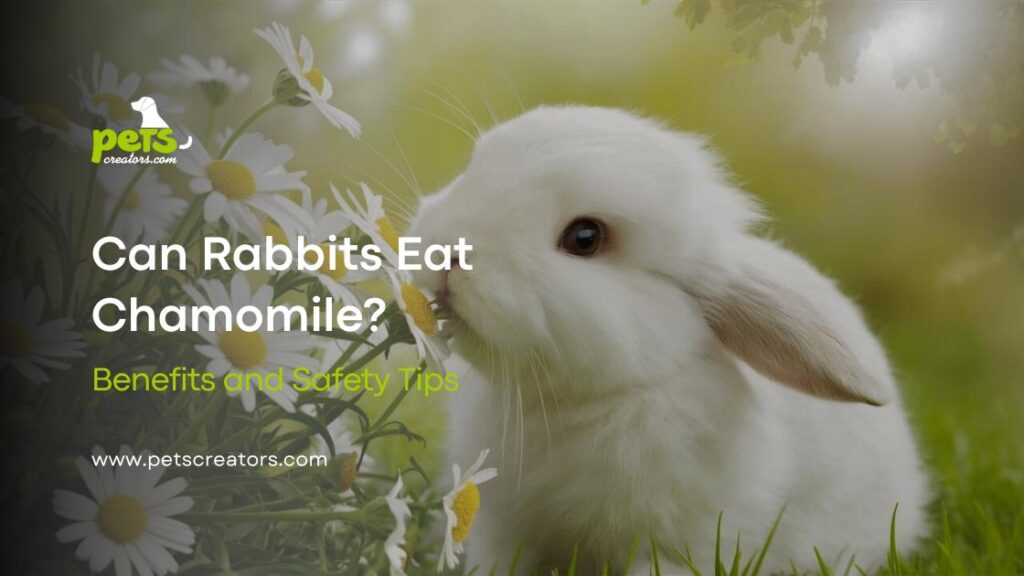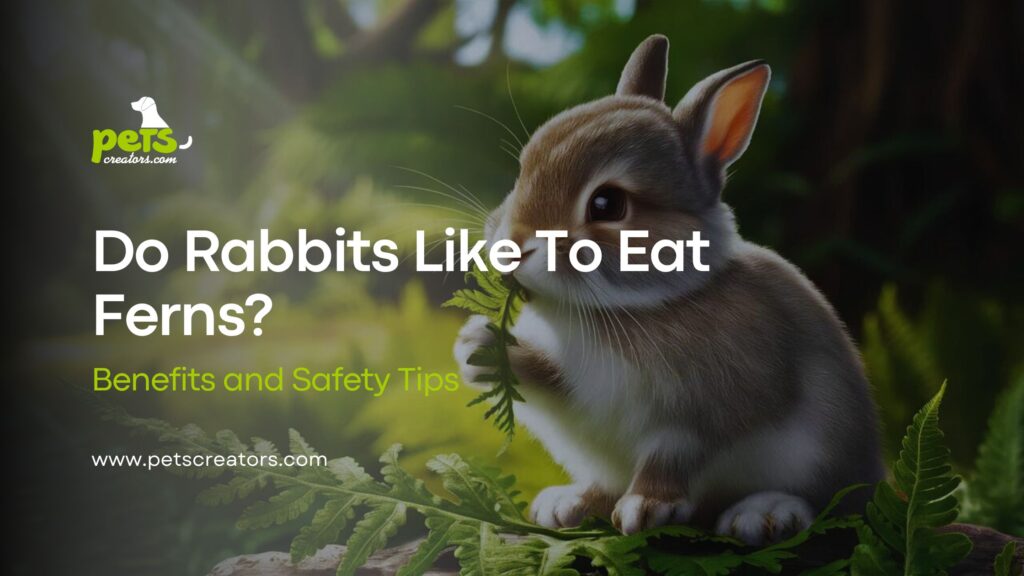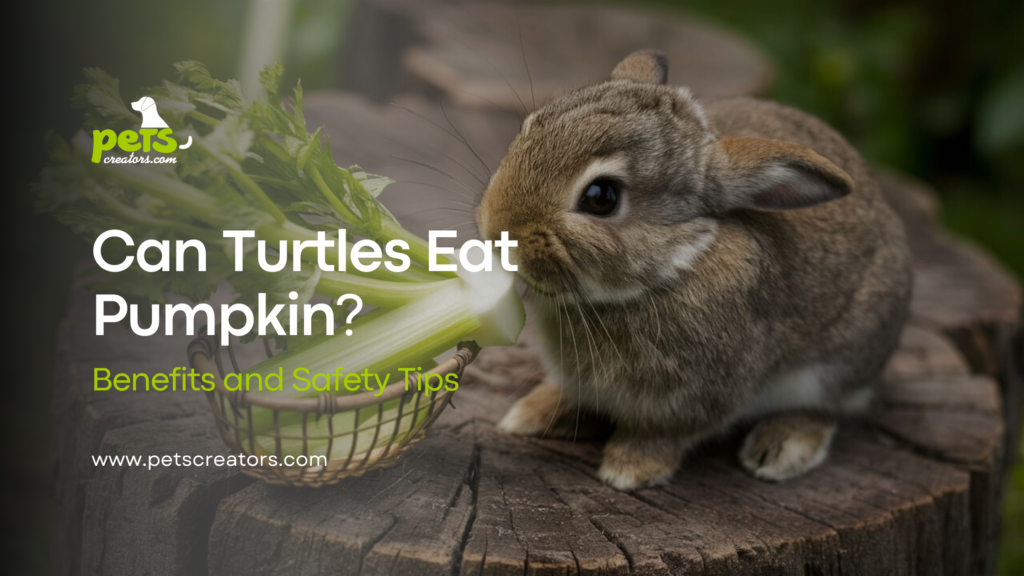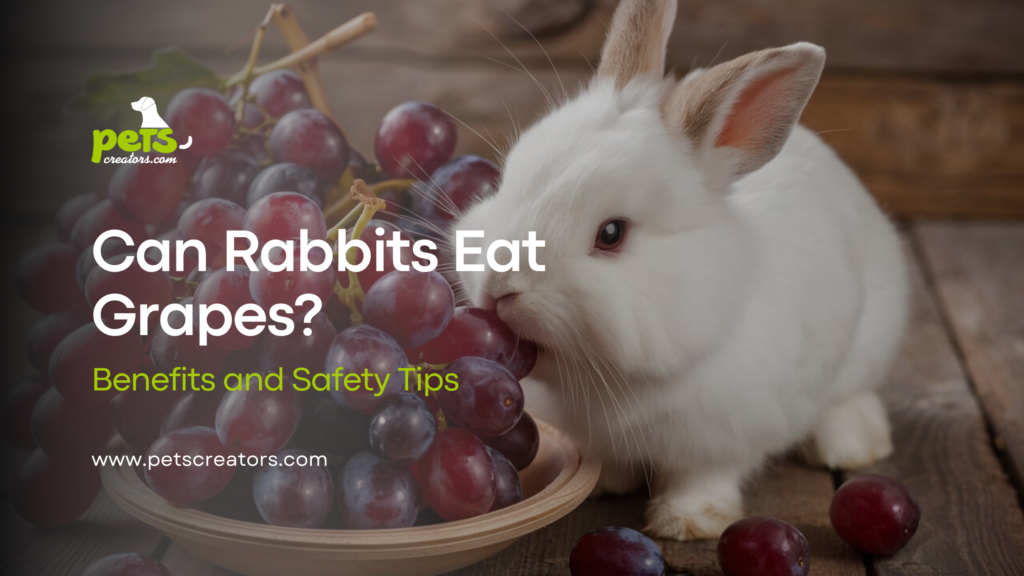Essentially, rabbits must be fed with appropriate kinds of foods to enhance their well-being. First of all, chamomile is an herb that is commonly recognized to have a calming effect, though its impact on rabbits is not very well established. In this roundup of chamomile, you will find out if it can be healthy and harmless for your rabbit to consume. It will also focus on possible dangers, nutrition facts, and ways to safely introduce chamomile to your pet. Head over to find all the information about feeding chamomile to your rabbit that you wouldn’t want to miss. Can Rabbits Eat Chamomile?
Safe Alternative to Rabbit Eating Chamomile?
As for feeding rabbits, people who have pets are always searching for sufficiently safe and as healthy as possible food. Although chamomile is one of the herbs that are believed to promote relaxation in humans, it is important to know the effects of chamomile on rabbits. Thus, first of all, to add some new product to a rabbit’s diet, it is necessary to know whether it is suitable or not. Some other herbs and vegetables are harmless and suitable for rabbits for consumption including basil, coriander or parsley. These alternatives have been evidenced as safe and may be used to diversify a rabbit’s diet without the risks inherent in chamomile.
Risks of Feeding Chamomile to Rabbits
Feeding chamomile to rabbits carries several risks. Chamomile contains certain compounds that might not sit well with a rabbit’s digestive system. Some rabbits may have allergic reactions or develop gastrointestinal issues from consuming chamomile. The herb can also interact with medications that a rabbit might be taking. It’s important to consult a veterinarian before introducing chamomile or any new food to ensure it won’t cause harm to your pet.
Effects of Chamomile on Rabbits
The effects of chamomile on rabbits can vary. While some rabbits might handle small amounts without any noticeable issues, others could experience digestive discomfort. Symptoms such as reduced appetite, lethargy, or changes in stool consistency can indicate that chamomile does not agree with your rabbit. Monitoring your rabbit closely after introducing any new food is crucial to catch any adverse effects early and adjust their diet accordingly.
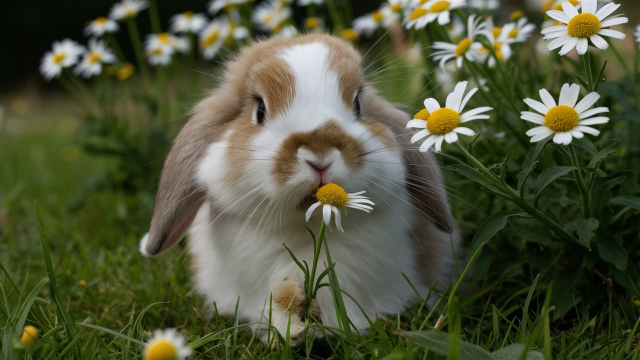
Are Chamomile Good for Rabbits?
Chamomile is not typically recommended for rabbits due to the potential risks involved. While it might offer some health benefits to humans, such as relaxation and anti-inflammatory properties, these benefits do not necessarily translate to rabbits. Rabbits have very specific dietary needs, and their digestive systems are sensitive. Sticking to a diet of primarily hay, fresh greens, and a small number of pellets is usually the best way to ensure they remain healthy.
Nutritional Value of Chamomile for Rabbits
Chamomile does contain some nutrients, such as antioxidants and anti-inflammatory compounds, but it does not provide any unique nutritional benefits that can’t be obtained from other safer herbs and vegetables. The primary diet for rabbits should consist of hay, which provides the necessary fibre for their digestive health. Fresh greens and vegetables can supplement their diet, but these should be chosen based on their known safety and nutritional benefits for rabbits.
How is Chamomile Made?
Chamomile is typically harvested, dried, and processed into tea or used as a dried herb. The process involves picking the flowers at their peak, drying them in a controlled environment to preserve their beneficial compounds, and then packaging them for sale. While chamomile tea is popular for human consumption, it’s important to remember that the preparation process might involve substances or additives that are not safe for rabbits.
What Types of Chamomile Are Safe for Rabbits?
There are different varieties of chamomile, such as German chamomile and Roman chamomile. However, determining the safety of these for rabbits can be tricky. Generally, it’s best to avoid giving any form of chamomile to rabbits unless specifically recommended by a veterinarian. The potential risks outweigh the benefits, and there are many other safer options available.
Do Wild Rabbits Eat Chamomile?
Wild rabbits might occasionally nibble on chamomile if they come across it, but it is not a significant part of their diet. Wild rabbits have a varied diet consisting mainly of grasses, leaves, and other vegetation they find in their habitat. They tend to avoid plants that might cause them harm, relying on their instincts to choose safe foods.
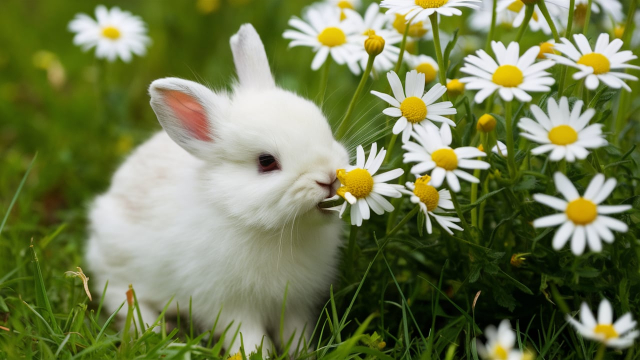
Why is Eating Chamomile Harmful to Rabbits?
Ingesting chamomile can be toxic to rabbits because their digestive systems have poor performance in breaking down certain molecules in the plant. Also, there is a potential of undergoing contamination from pesticide residues or any other chemical used in the process of growing and or producing chamomile. Sabrina pointed out that rabbits have super sensitive constitutions and anything new to them can harm them in a very big way.
Store-bought Chamomile and Rabbits
Store-bought chamomile, especially in the form of tea bags or dried herbs, may contain additives or preservatives that are not safe for rabbits. These products are not formulated with the needs of rabbits in mind and can introduce harmful substances into their diet. If you consider giving chamomile to your rabbit, it’s crucial to ensure that it’s free from any additives, but even then, it’s safer to opt for other known safe herbs.
How Often Can My Rabbit Eat Chamomile?
If you decide to offer chamomile to your rabbit, it should be in very small amounts and only occasionally. However, due to the potential risks, it is generally recommended to avoid feeding chamomile altogether. Rabbits thrive on consistency and a diet that is rich in hay, fresh greens, and rabbit-specific pellets. Introducing new foods, especially those with questionable safety like chamomile, should be done with extreme caution and preferably under the guidance of a veterinarian.
How Many Types of Chamomile Are There?
Chamomile comes in different varieties, but the two most widespread ones are the German chamomile and the Roman chamomile. They are not very different from each other, but the impact on rabbits is not researched well enough to draw distinctions. Considering the aforementioned effects, it is advised to avoid feeding chamomile in any form to your rabbit and find other alternatives to include in the diet.
Observing Your Rabbit After Eating Chamomile
Should you find that your rabbit has ingested chamomile, monitor it for signs of discomfort or sickness. I specifically noticed that one should always look at signs such as a change in appetite, sluggishness, diarrhoea, or anything out of the norm. If you find these signs in your pet, it is advisable to consult the veterinarian as soon as possible. This is the reason why, observing your rabbit’s health should always be done whenever a new type of food is to be fed to them.
What About Chamomile Seeds and Leaves?
Chamomile seeds and leaves might seem like a natural treat for rabbits, but they pose similar risks to the flowers. The seeds could potentially cause digestive blockages, and the leaves might contain compounds that are not safe for rabbits. Sticking to safer, rabbit-friendly herbs and vegetables is always the best choice to ensure their well-being.
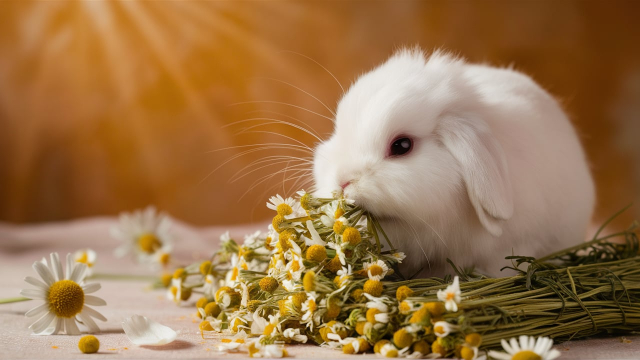
Tips for Serving Chamomile to Bunnies
If you decide to serve chamomile to your bunny, do so with caution. Make sure the chamomile is organic and free from pesticides or other chemicals. Introduce it slowly and in very small amounts, mixing it with their regular greens. Always monitor your rabbit for any adverse reactions and be prepared to discontinue if any issues arise. Consulting with a veterinarian before introducing chamomile is highly recommended.
How Does Chamomile Digest in Rabbits?
Rabbits have a unique digestive system that is very different from humans. They rely heavily on fibre to keep their digestive tract moving efficiently. Chamomile does not provide the necessary fibre and might disrupt their delicate digestive balance. This can lead to issues such as stomach upset, gas, and more severe gastrointestinal problems.
What are the Nutritional Benefits of Chamomile for Rabbits?
While chamomile has some nutritional benefits, such as vitamins and antioxidants, these are not unique enough to justify the potential risks involved in feeding it to rabbits. Many other herbs and vegetables provide similar or better nutritional benefits without the associated risks. Safe options like basil, parsley, and cilantro offer a more reliable source of nutrition for rabbits.
Do Rabbits Enjoy Chamomile Food?
Rabbits might enjoy the taste of chamomile due to its aromatic and slightly sweet flavour, but enjoying food does not necessarily mean it is good for them. Rabbits can be curious eaters and might nibble on a variety of plants, but it’s our responsibility as pet owners to ensure that what they eat is safe and beneficial for their health.
What Parts of Chamomile Can Rabbits Eat?
If you choose to give chamomile to your rabbit, it’s best to stick to the flowers and avoid the stems and leaves. However, due to the potential risks, it’s generally advised to avoid feeding chamomile in any form. Many other plants are completely safe for rabbits and can be included in their diet without worry.
Can Rabbits Eat Chamomile Seeds?
Chamomile seeds should be avoided as they can pose a risk of digestive blockages in rabbits. Seeds are generally not a part of a rabbit’s natural diet and can cause more harm than good. It’s best to stick to foods that are known to be safe and healthy for rabbits, ensuring they get all the nutrients they need without the risks associated with seeds.
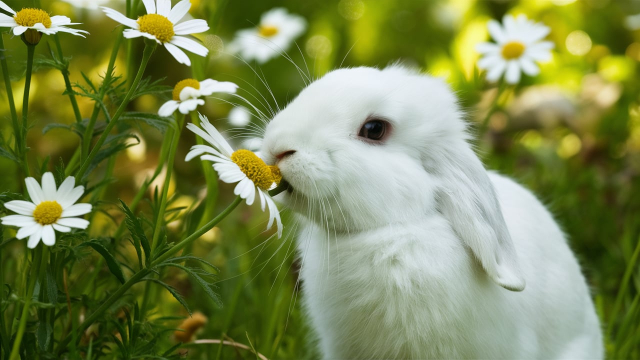
Can Chamomile Be Toxic to Rabbits?
Although chamomile is a safe herb, it may pose a danger to rabbits when ingested in large quantities or when the chamomile has been sprayed with pesticides or any chemical substances. The actual substances of chamomile possibly dangerous for rabbits are unknown or not investigated, yet the possible rates of toxicity are high. As a general rule, it is always wise to ensure that the rabbit you are feeding is safe from certain foods.
Can Chamomile Cause Digestive Problems in Rabbits?
Yes, chamomile can cause digestive problems in rabbits. Their digestive systems are very sensitive, and introducing new or unusual foods can lead to issues such as stomach upset, gas, and changes in stool consistency. Keeping their diet simple and consistent with foods that are known to be safe is the best way to avoid digestive problems.
How Do You Introduce Your Bunny to Chamomile?
If you choose to introduce chamomile to your bunny, do so very gradually. Start with a tiny amount mixed with their regular greens and observe for any adverse reactions. Ensure the chamomile is organic and free from chemicals. However, given the potential risks, it is usually best to avoid chamomile altogether and choose safer alternatives for introducing new foods.
Preparing Chamomile for Rabbits
If you decide to prepare chamomile for your rabbit, make sure it is organic and free from any pesticides or additives. Wash it thoroughly and serve it in small amounts mixed with other safe greens. Always introduce new foods slowly and monitor your rabbit for any signs of distress. Consulting with a veterinarian before making any changes to your rabbit’s diet is always a good practice.
How Do Rabbits Eat Chamomile?
Rabbits might nibble on chamomile flowers if offered, but this should be done with caution. They might enjoy the taste, but their digestive systems are not well-suited to process chamomile in large quantities. Always offer new foods in moderation and observe your rabbit’s reaction closely.
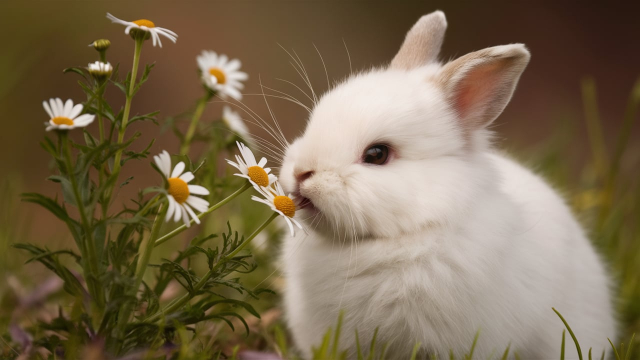
What Happens if Rabbits Eat Too Much Chamomile?
If rabbits eat too much chamomile, they might experience digestive upset, including stomach pain, gas, or changes in stool. In severe cases, it could lead to more serious gastrointestinal issues. If you notice any signs of distress after your rabbit consumes chamomile, contact your veterinarian immediately for advice.
What If My Rabbit Eats a Large Amount of Chamomile?
However, if your rabbit has taken a lot of chamomiles, the rabbit needs to be watched to determine whether it is feeling sick or uncomfortable. Some signs to look out for patients are if they are refusing their food, appearing more sluggish than normal or having diarrhoea or any strange behaviours. If any of these signs are present, then you should consult your veterinarian promptly. It’s always good to be careful especially when it comes to your bunny’s health chances.
How Much Chamomile Can My Rabbit Have?
If you decide to offer chamomile to your rabbit, do so in very small quantities and only occasionally. The safest approach is to avoid chamomile altogether and stick to a diet of hay, fresh greens, and pellets. This ensures that your rabbit gets the necessary nutrients without the risk of digestive issues or other health problems.
When Shouldn’t You Feed Chamomile to Your Rabbit?
Avoid feeding chamomile to your rabbit if they have a history of digestive issues, are currently on medication, or if you are unsure about the quality and safety of the chamomile. It is always best to err on the side of caution and choose safer alternatives that are well-documented as being beneficial for rabbits.
Can Baby Rabbits Eat Chamomile?
Baby rabbits have even more sensitive digestive systems than adults and should not be given chamomile. Their diet should consist primarily of their mother’s milk, and as they begin to wean, they should transition to hay and safe, rabbit-friendly vegetables. Introducing potentially harmful foods like chamomile can cause serious health issues in young rabbits.
How Frequently Should Adult and Baby Rabbits Be Fed Chamomile?
Chamomile should not be a regular part of a rabbit’s diet. If you choose to offer it, do so very sparingly and only as an occasional treat. Given the potential risks, it is generally recommended to avoid chamomile altogether and focus on safer, more nutritious options for both adult and baby rabbits.
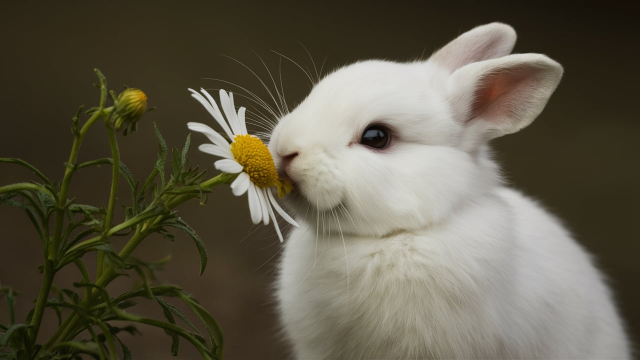
Potential Dangers in Chamomile
Chamomile can pose several potential dangers to rabbits, including digestive upset, allergic reactions, and possible toxicity from pesticides or other chemicals. The risks involved with feeding chamomile outweigh any potential benefits, making it an unsuitable choice for a rabbit’s diet.
What If My Rabbit Accidentally Eats a Lot of Chamomile?
If your rabbit has ingested a huge quantity of chamomile by accident, observe their health status closely for any deterioration. This condition has symptoms such as appetite loss, fatigue, or changes in the regular pattern of bowel movements. If you are experiencing any side effects then you should consult with your veterinarian as soon as possible. One must not delay seeking medication to avoid the development of severe complications.
Monitoring Your Rabbit’s Health with Chamomile
If you decide to offer chamomile to your rabbit, do so with extreme caution and monitor their health closely. Watch for any changes in behaviour, appetite, or stool, and be prepared to remove chamomile from their diet if any issues arise. Regular veterinary check-ups are essential to ensure your rabbit remains healthy and to catch any potential problems early.
Incorporating Fresh Greens and Vegetables
Incorporating fresh greens and vegetables into your rabbit’s diet is a great way to provide variety and essential nutrients. Safe options include leafy greens like romaine lettuce, cilantro, parsley, and basil. These foods offer the necessary vitamins and minerals without the risks associated with chamomile.
What Actions Should I Take if My Rabbit Consumes Chamomile?
If your rabbit consumes chamomile, observe them closely for any signs of distress. Contact your veterinarian if you notice any adverse reactions or if you are concerned about the amount consumed. Keeping a close eye on your rabbit’s behaviour and health is crucial whenever they consume something new or potentially harmful.
Creating a Balanced Diet With Chamomile
Creating a balanced diet for your rabbit does not need to include chamomile. Focus on providing a diet rich in hay, fresh greens, and a small amount of pellets. This ensures they receive all the necessary nutrients for optimal health without the risks associated with chamomile.
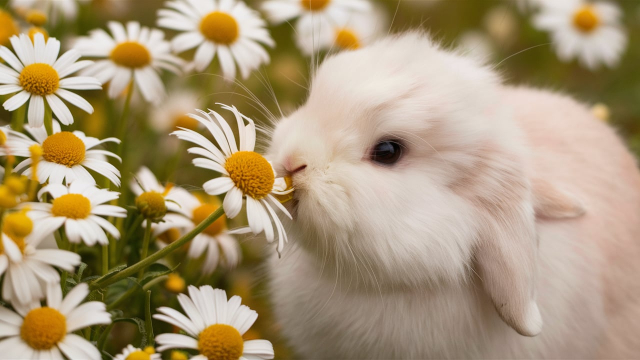
My Rabbit Ate a Whole Chamomile Flower
If your rabbit eats a whole chamomile flower, monitor them closely for any signs of illness. While a single flower might not cause significant harm, it’s important to watch for any adverse reactions and contact your veterinarian if you notice any changes in behaviour or health.
Can Rabbits Eat Wild Chamomile?
Wild chamomile might be even riskier due to potential exposure to pesticides or other environmental contaminants. It’s best to avoid feeding wild chamomile to your rabbit and stick to safer, known food sources that are free from harmful substances.
What Else Can I Feed My Rabbit Besides Chamomile?
As I said before, there are many other safe and nutritious foods that you can feed your rabbit. Vegetables like lettuce, kale, coriander and parsley are also appropriate to be consumed in large amounts. Other foods suitable for their diet are vegetables such as bell peppers, carrots, and cucumbers. It is recommended that children always be given new foods in small portion sizes, veryřídce.
How to Create a Rabbit-Friendly Garden?
Creating a rabbit-friendly garden involves planting safe, rabbit-friendly herbs and vegetables. Consider growing basil, parsley, cilantro, and mint. These herbs are not only safe for rabbits but also beneficial for their health. Ensure the garden is free from pesticides and other harmful chemicals to keep your rabbit safe.
Chamomile Feeding Guidelines and Amounts
If you decide to feed chamomile to your rabbit, do so in very small amounts and only occasionally. It’s best to avoid chamomile altogether due to the potential risks. Stick to safer, well-documented foods to ensure your rabbit remains healthy and happy.
Rabbit Treats Made at Home With Chamomile
While it’s tempting to create homemade treats for your rabbit, chamomile should not be included due to the potential risks. Instead, focus on using safe ingredients such as fresh greens, hay, and rabbit-friendly vegetables. There are many recipes available for homemade rabbit treats that are both safe and nutritious.
Conclusion
Giving them chamomile is an issue that cannot be lightly discussed. Despite the identified potentials, the hazards are more apparent most of the time. Thus, the rabbit’s health should be cared for as a priority, and this can be achieved by taking him/her on a diet of known safe foods only. Before giving your pet chamomile or any other food for that matter, you should seek the advice of a veterinarian. It is therefore wise to be alert and knowledgeable to provide a rabbit-balanced diet that enhances their wellbeing.
FAQs
Is chamomile safe for rabbits?
Chamomile can pose risks to rabbits, including digestive upset and potential toxicity. It’s generally safer to avoid feeding it to your rabbit.
Can rabbits eat chamomile flowers?
While some rabbits might tolerate small amounts, it’s best to avoid chamomile flowers due to potential health risks.
What are safer alternatives to chamomile for rabbits?
Safe alternatives include basil, cilantro, parsley, and other leafy greens like romaine lettuce and kale.
Can baby rabbits eat chamomile?
No, baby rabbits have sensitive digestive systems and should not be given chamomile.
What should I do if my rabbit eats chamomile?
Monitor your rabbit closely for any signs of distress and contact your veterinarian if any adverse reactions occur.
How much chamomile can I give my rabbit?
If you choose to give chamomile, it should be in very small amounts and only occasionally. However, it’s best to avoid it altogether.
Do wild rabbits eat chamomile?
Wild rabbits might nibble on chamomile if they come across it, but it is not a significant part of their diet.
Can chamomile cause digestive problems in rabbits?
Yes, chamomile can cause digestive problems, including stomach upset and changes in stool.
What parts of chamomile can rabbits eat?
If you decide to offer chamomile, stick to the flowers and avoid stems and leaves. However, it’s generally safer to avoid it entirely.
Are store-bought chamomile products safe for rabbits?
Store-bought chamomile may contain additives or preservatives that are harmful to rabbits. It’s best to avoid these products.

